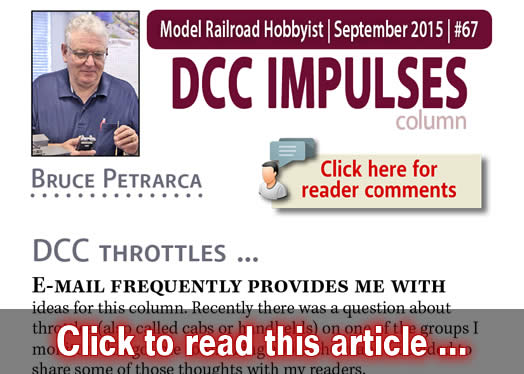DCC - Electrical
Bi-directional semaphore signalling
Hi All,
My next project i'm planning at the moment, is the installation of a fully operational semaphore signaling system on my layout.
Now my layout, being based on a prototype location is a bi-directional single track mainline at each end, with a four track station yard.
peco insulfrog turnouts
i have decided to go with peco track / turnouts. can somebody give me a diffinitive answer on the "insulfrog" design. my question is , with these units, is ANY additional wiring required for crossovers / reverse loops etc etc? im getting the idea that using these "dcc friendly" units is more plug and play. i know this subjuct has probably been addressed many times, i havent found the search function on this forum yet!

SMA19 Working HO Scale Helicopter
Model animation—bringing models to life—adds enormously to the interest and enjoyment of any layout or individual model! In the midst of the self-created kaos of preparing clinics for the 2015 NMRA convention, I snuck in the time to work on this animation of a DCC controlled UH-1H Iroquois helicopter, that I built for a friend. This video captured the project just after I competed all but the final details and decaling, just before it flew off my workbench. All the sounds are generated by the model as you see it and hear it.

Glenn Westlake Middle School Model Railroad Club--Construction Phase
Well It is time to start up the new blog for the school club for construction and we already have a pretty good start. I won't say much more here just to keep the intro short so read on..

Build an optical detector circuit
The simple crossing signal circuit was designed to be operated by a manual switch, but it's fairly easy to automate it. This thread will start with a basic two detector version but eventually I hope to present a way to add as many detectors as you like and a time delay circuit to let trains clear before releasing the crossing. This circuit depends on ambient light to operate, but the level needed to trigger it is adjustable.
This is the schematic:

Powering turnout frogs
I see in the new MR magazine (News & Products) that ANE Model has a new SmartFrog V.4 board for powering turnout frogs. Their website and instructions are not clear if these are similar to the popular Tam Valley Frog Juicers circuits. The picture of the new board shows multiple screw wire connections where it appears that 8 frogs could be attached. I was wondering if anyone has tried this new product and whether it really can handle more frogs than its Tam Valley counterpart.

Build a crossing signal circuit
As I mentioned in my Building Simple Circuits thread, putting electronics together is an underappreciated part of model railroading. This note is another in my series of attempts to spread knowledge of this surprisingly simple skill. This will show how to work with an integrated circuit and an easy technique to go from a working breadboard to a permanent module.
JMRI Interface hardware
I was down at a local electronics distributor buying some cable for my DCC throttles when I saw this on the counter: a PoE Power over Ethernet Injector. There was a green side plug that is exactly like my Lenz system uses. I was thinking that I could use this to interface my Mac with my Lenz DCC to run JMRI. It was affordable too, at $55.
Does anyone have an idea of what this is and if it can be used with JMRI?
Thanks.
Feeder Wire Gauge 20 or 22?
I'm starting to lay track on my first layout. I'm wondering which gauge wire to use as feeder drops from the rails,
# 20 or 22? I am modeling in HO scale
Thanks Mark
>> Posts index
Navigation
Journals/Blogs
Recent Blog posts:
